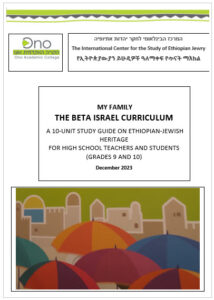MY FAMILY
THE BETA ISRAEL CURRICULUM

STARTER
Teachers should begin this unit by telling their students:
As you recall, we opened Unit 4 with a story of two people who were each given an item of clothing 2,500 years ago. In that thought experiment, we discussed how differently each group of descendants preserved their item of clothing. This gave us deeper insight into the Beta Israel’s Jewish philosophy and values in relation to other Jewish groups. In Unit 5, we’ll learn about the Beta Israel’s Jewish laws and customs, using the same kind of thought experiment. But this time, let’s talk about soup.
Imagine that 2,500 years ago, Person A was taught a soup recipe that had been passed down through generations. This soup recipe was relatively simple: it just took water, some vegetable, and a few dashes of spices. Person A’s descendants – Group A – continued to follow this traditional soup recipe, making just a few minor adjustments as needed: at times, some of the original spices became unavailable, and one of the original root vegetables had to be replaced for a more accessible local variety. Still, for the next 2,500 years, Group A’s soup recipe stayed very close to the original.
Person B was taught the same relatively simple soup recipe 2,500 years ago. But Person B’s descendants – Group B – faced many more challenges than Group A and were forced to move a lot. As such, Group B had to adjust their soup recipe quite a bit, changing a few more elements each time they moved, adapting to different environments. They also added some new ingredients, like chicken and matzah balls. Over time, this adjusted recipe became widely accessible and traditionally accepted.
Having explained these two scenarios, the teacher should ask the following:
- After 2,500 years, whose recipe do you think is more authentic? That of Group A or Group B?
- Imagine Group B told Group A that their recipe was wrong because it was missing ingredients such as chicken and matzah balls. How do you think members of Group A would react to this?
It is important to note that different students may offer very different responses to these questions, based on their understanding. After hearing student feedback, teachers should explain, with sensitivity:
There are many ways to answer these questions, but it should be clear that Group A’s recipe is closer to the original than Group B’s, considering that it was changed less frequently. So, if members of Group B were to tell members of Group A that their recipe was off because it was missing an original vegetable or spice, they would be on to something. But if Group B was to say that Group A’s recipe was inherently wrong because it was missing chicken and matzah balls (ingredients that were clearly added in the interim period), then members of Group A would understandably be irritated and perhaps even insulted. How could Group A’s recipe be wrong just because it doesn’t include the same new ingredients as Group B’s? Of course, some members of Group A may now prefer Group B’s recipe – after all, it has become more accessible. But this doesn’t make Group A’s recipe any less authentic.







